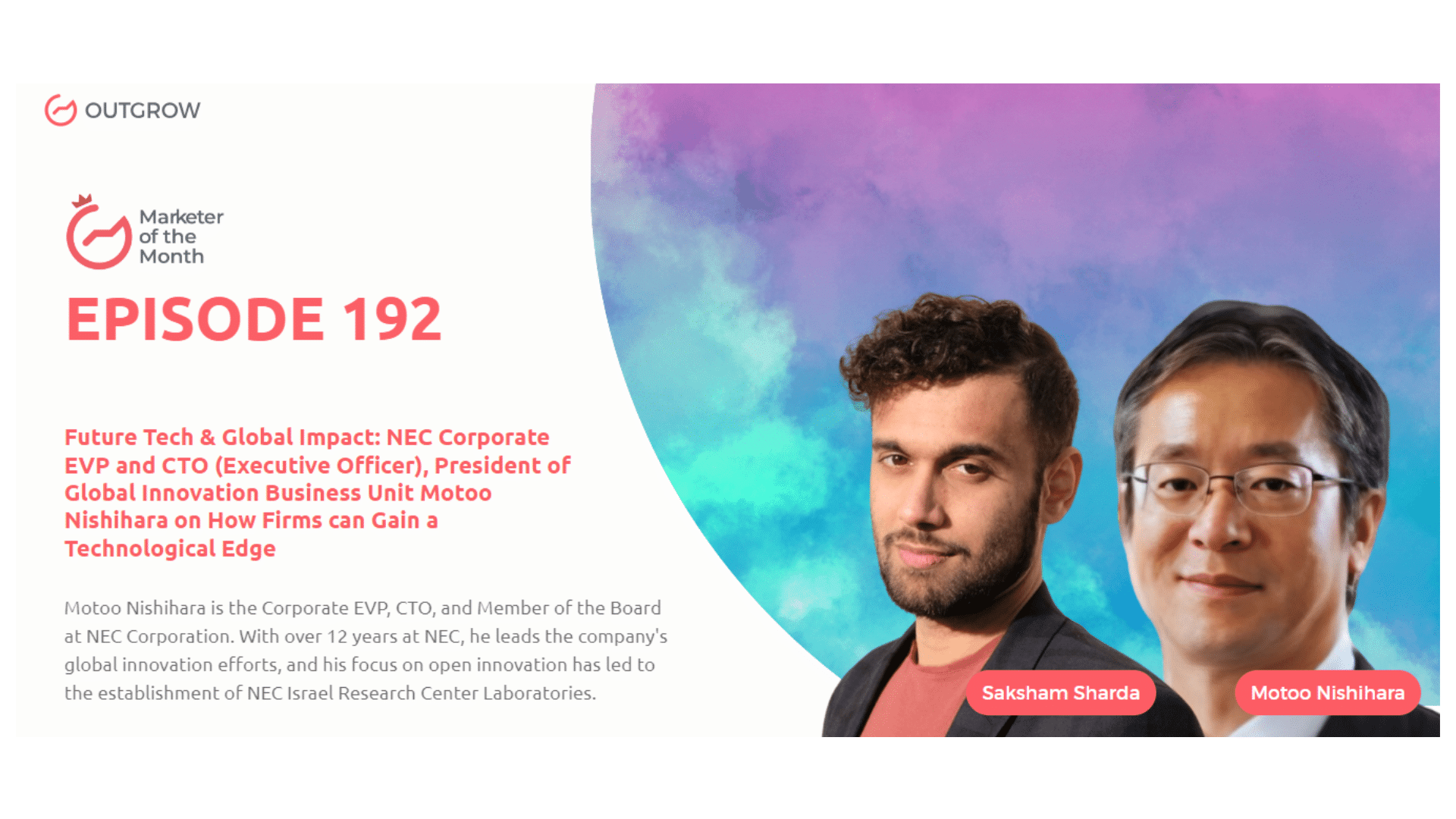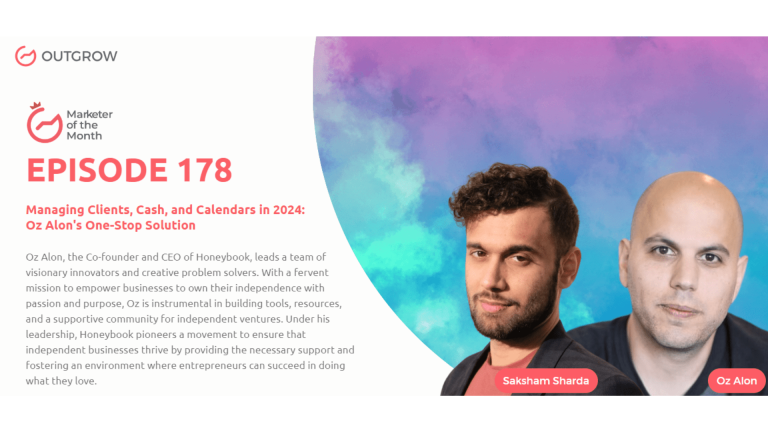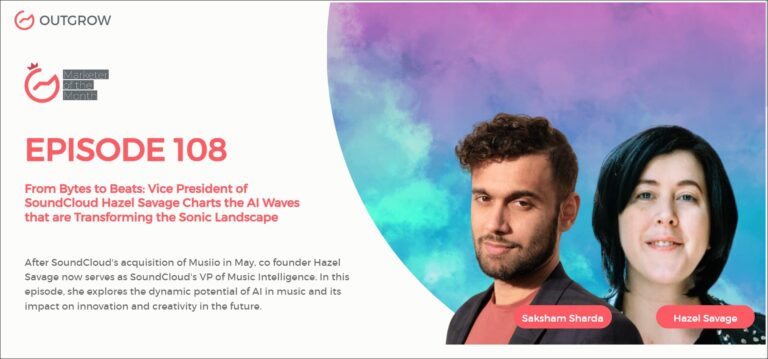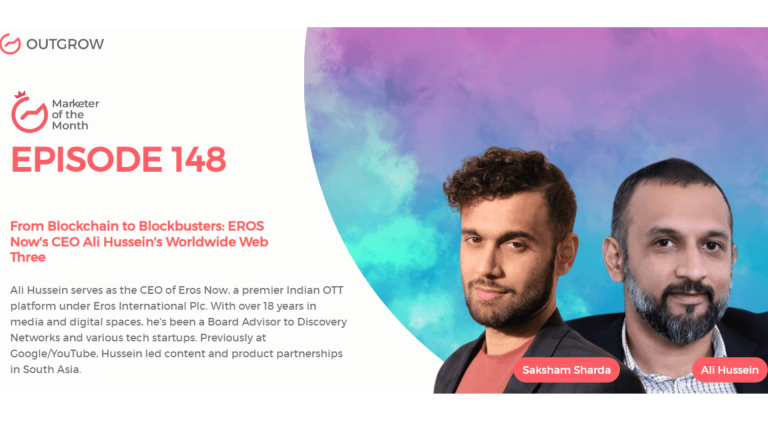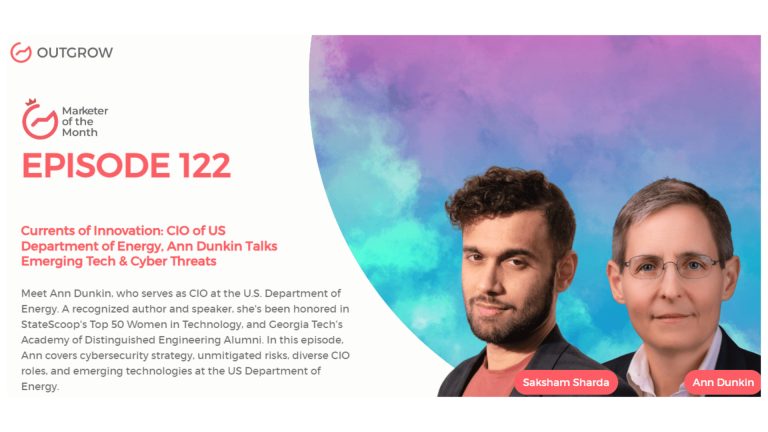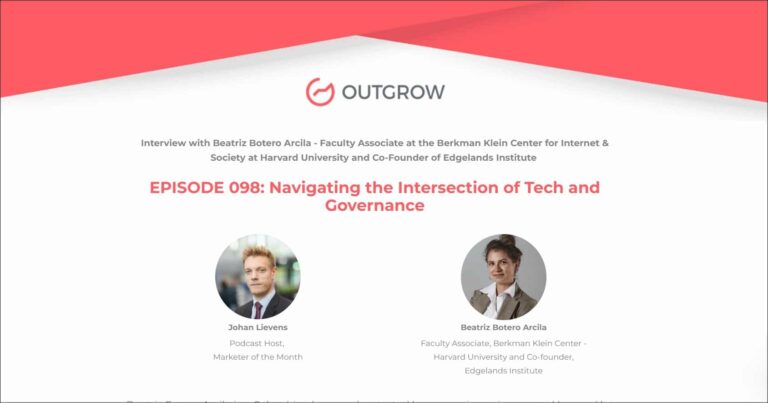EPISODE 192: Marketer of the Month Podcast with Motoo Nishihara
Table of Contents
Hey there! Welcome to the Marketer Of The Month blog!
We recently interviewed Motoo Nishihara for our monthly podcast – ‘Marketer of the Month’! We had some amazing insightful conversations with Motoo and here’s what we discussed about –
1. Exciting Innovations: Compact, powerful model with rapid response and facial performance.
2. Optical Fiber Sizing: Utilizing fibers for data communication and networking.
3. Collaboration Approach: Fostering alignment through resource allocation.
4. Research Areas: Focus on AI, security, and networking for future growth.
5. Open Innovation: Advantages include funding increases; challenges involve governance.
6. Future Opportunities: AI, quantum computing, and 5G/6G networking are promising.
About our host:
Dr. Saksham Sharda is the Chief Information Officer at Outgrow.co. He specializes in data collection, analysis, filtering, and transfer by means of widgets and applets. Interactive, cultural, and trending widgets designed by him have been featured on TrendHunter, Alibaba, ProductHunt, New York Marketing Association, FactoryBerlin, Digimarcon Silicon Valley, and at The European Affiliate Summit.
About our guest:
Motoo Nishihara is the Corporate EVP, CTO, and Member of the Board at NEC Corporation. With over 12 years at NEC, he leads the company’s global innovation efforts, and his focus on open innovation has led to the establishment of NEC Israel Research Center Laboratories.
Future Tech & Global Impact: NEC Corporate EVP and CTO (Executive Officer), President of Global Innovation Business Unit Motoo Nishihara on How Firms can Gain a Technological Edge
The Intro!
Saksham Sharda: Hi, everyone. Welcome to another episode of Outgrow’s Marketer of the Month. I’m your host, Dr. Saksham Sharda, and I’m the creative director at Outgrow. co. And for this month we are going to interview Motoo Nishihara, who is the EVP, CTO, Member of the Board, Head of the Global Innovation Unit at NEC Corporation.
Motoo Nishihara: Great to be here. Thank you.
Don’t have time to read? No problem, just watch the Podcast!
Challenge yourself with this trivia about the exciting topics Motoo Nishihara covered in the podcast.
Or you can just listen to it on Spotify!
The Big Questions!
Saksham Sharda: Alright, Let’s start with the first question. So as the executive vice president and CTO at NEC corporation, you oversee global innovation efforts. Could you tell us about a recent innovation or technology development you’re particularly excited about?
Motoo Nishihara: Yeah, I’d like to highlight the three topics. One, neither our original version of its model, which I, produced a hobby ago, it’s aside from the very compact, and probably tourists be the one13th of the other computer down. And because it is due to the reduced size, and it did very cool power, it consumed the powerless powers. Also, the response is rapid. And VP and coration performance is very good at the time. And the second one is we see good data face recognition, and biometrics, and they will record your currency. So we integrate those kinds of visual AI technology with ADDM. Then we can come up with many new solutions. And we have already deployed that kind of solution in the public sector. And that’s the second topic. And second one is optical fiber sensing. It’s a sensitive technology, initially, the good data communication, and networking, and we are also the one with the three major bands to deploy the submarine cable. We recently noticed that kind of fibers could be useful for that, even though since you have the by ratio, you can detect a movement or something. I’ve always fiber and also found, that so many things can be collected from the fiber says that 3d technology is very surprising. And also impressive for me.
Saksham Sharda: So you’ve also been instrumental in promoting the concept of ecosystem R&D at NEC. Can you explain what this concept entails and how it has influenced NECs approach to research and development?
Motoo Nishihara: Yeah, so we started the concept of the R&D ecosystem, six, I think, several years ago, and so, this concept, they expand the notion of the topic of Asia, but it is going to furthermore and so, for example, we redeployed we provide our own technology to the outside, so that there may be a situation people can utilize our technology for their purposes. And to do this kind of thing, we can find a new type of market internally and it is easy to find. So the data, the scoring, the new market, the based on the technology, and the other around the ecosystem is more like a we can utilize other technology outside and see. And we can explore the new type of B like. For example, when we started a new business, I was at AIG, right? And healthcare. And these are recently outside of the NBC originals being active, but through the discussion with a partner without sight, we can explore those kinds of things. And then we can integrate our technology with other outside company technology. So that kind of the deliverable or the out of the ecosystem. So basically, out on the ecosystem, either prepare that new good day environment for the NBS for the initial income and it is a new innovation, and new business. That’s all.
Saksham Sharda: So your role involves managing NEC research laboratories across various locations. What are some of the key areas of research that these laboratories are currently focusing on, and why are they important for NECs future growth and innovation?
Motoo Nishihara: Yeah, we have a seven laboratory all over the world and each other with each feature and the role and initial with America and the NEC level Europe and Japan, our focus on the core technology and other laboratories fusing more like a research based on the core technology, that distribution the role and interval the technology areas. I think AI and security and network are key parts of the industry because we have looked over system integration and new studies, John, what services are being created based on those technologies? And so I just want to highlight that most of them is AI, as I said in the, for the fourth question, and see the new generative AI services. And I feel AI has tremendous capability for the future. So actually, half of them, probably half of the researchers of the total. So just focusing on AI technology right now.
Saksham Sharda: So open innovation has been a focus for NEC with efforts to collaborate with partners, startups, academia, and outside capital. What are some of the advantages and challenges you have encountered in pursuing open innovation, especially in the technology sector?
Motoo Nishihara: Okay. So you’ve doubled the advantage, which I incorporate outside investment into our research, which means that we can raise up the funding for the sound initiative. And so that’s one thing and so do that kind of the increase of the funding, maybe we can accelerate that too much, or updating over technology, that’s a good thing. And also, I want to point out that sort of like why learning that technology from outside and you see can explore the new market, beyond the current businesses, and like an AI drug and drug recovery or drug, lots, I mean, drug search, and also the healthcare kind of business, it is also agriculture, business, it is a typical example, all over the world who have what they said, and this is a very new video said we are going to see. And in terms of disadvantage, there are a couple of things. One is, since we incorporate investments from outside or R&D, and the work for our target, probably we have limited governance for that company for that area. So didn’t need that. I’m very rent-friendly and good relationship with a partner and it’s essential that can see another disadvantage so far, I don’t have noticed this other type of thing as a CTO of NEC.
Saksham Sharda: As a CTO of NEC, what role do you play in shaping the company’s technology strategy and what key initiatives are you currently focusing on?
Motoo Nishihara: Okay, so as the CTO, I have a responsibility to make that future technology asset for the industry, the future businesses. So I make some kind of portfolio over the technology clutter who’s ever NEC’s and so that maybe budget shouldn’t be limited. And based on that kind of genius to allow the managing these regional resources, or that business it’s very important that one thing and the other thing is incubation, I’m seeing like a healthcare Well, AI drug. And maybe they didn’t have AI and application R&D sector, so they explored the new market. So that’s the challenge for us. And especially in terms of the Generative AI. I mean, this April, we started a new organization named the native AI Center. We did come including the research and also the mass of development, and also the business equation sees me progress over technology, and so forth. We need to think about, how to integrate the activity and the commercial activity. Usually, they’re some kind of pipeline from our research, and development, in essence, but it takes time. So we have to combine the organic and last, that’s kind of the role for me.
Saksham Sharda: So all in all, it seems collaboration is a significant aspect of your work. How do you foster collaboration and innovation within NEC research laboratories and across different departments?
Motoo Nishihara: Okay, so there are so many ways, one thing that I think is related to a different perspective on what people think about the future based on their technology. Only culturally BSI doesn’t care about how That’s kind of the escape box, I think that how to utilize the technology for other kinds of purposes, the purpose is very important. So this scope is different. But and so the point here, but then we have to die now, the different direction to the wild buying that the important thing. So, all activity, that I’m doing in the industry right now is how to connect those lines. In order to achieve that kind of alignment, we made a couple of schemes in terms of the budget, resource allocation, and also the shouting the technology visuals here the visuals at the same time. So those kinds of human resources, humans understand the activity, and the very important is identity group.
Saksham Sharda: So you have a diverse educational background in engineering and physics. How has this multi-disciplinary knowledge influenced your approach to technology development and innovation?
Motoo Nishihara: Okay, I’ve already done engineering over networking flow there, and system integration and things. After that, I will switch to the different divisions. and the mission is to make a new product with a new market. It’s not a B incubation activity I did for maybe 10 years. After that, I joined research laboratories, and I do good research, and management all over the world. So I have so in that sense, I have two perspectives, one either decided point of view, and the other one is more like a business point of view and the market point of view. So that kind of logical perspective with could be a very good fit for what I’m doing right now.
Saksham Sharda: So NEC is known for its commitment to social impact through technology solutions. Can you discuss some projects or initiatives where NEC technology has been used to address societal challenges?
Motoo Nishihara: So I will, yeah, they’re their main project in the order of the world. And I want to point up one huge project, it’s data identification solutions, for India, and in India, I think there are so many newborn babies, and some villages and some rural areas don’t have that many details, registrations, cables, and newborn babies. So we use this more like identification technology for maybe Iris, we’re a fingerprint and the for the new baby and the Show the fingerprint or the baby Iris, you can identify the person beyond maybe 10 or video people. So, through this, while the Indian government doesn’t yet have a new type of national digital ID system, which is called I see others or something, it is very good for them in their healthcare and India and probably governance for the people. And so, that is the one thing we are using the environment of technology for that policy. The other option is maybe carbon neutral and say initially the ICT company we are focusing on technology at the computing networking the AI or software, but in order to make a carbon neutral kind of self-monitoring and also the optimization of the system is very important. So we can contribute to this aspect of carbon neutrality and there are so many projects all over the world in the carbon neutral area.
Saksham Sharda: So what does your typical day at NEC look like? You wake up and then?
Motoo Nishihara: Yeah, I wake up early in the morning and I go to my office. I will check my email and under the I write about a meeting and so including the discussion with oversee laboratory overseas customers. Also, I am the CTO, I have a lot of relationships with a bigger sector and the V sector of that huge customer. So I have to adapt to the type of customer and to discuss and also think about the new solution with customers and that can sink. Also, I have a two-minute trip here. So the overseas and include The initial subsidiary also that I initially the customer all about. So it’s very busy, but also very exciting, and good. Good for my health and young for my mind.
Saksham Sharda: So looking ahead, what do you see as the most exciting opportunities or areas of growth for NEC in the coming years? And how do you plan to capitalize on them?
Motoo Nishihara: Fortunately, NEC has had convicting growth for almost three years. And then sales and profit are increasing year by year. And the stock price is also double as say one year ago. And so looking at the future, I think, AI technology, and also the new type of computing technology, like the quantum, and also the new big spout, networking, like a 5G or 6G, and satellite communication. And the initial good at those areas, I think, and each area, how, with a very astonishing breakthrough right now, as you know, so in the 5 years, 10 years, I think we have a tremendous opportunity for the future, maybe society, and the economics and industry may be the radical change. And I think I hope NBC can contribute. They’re transforming the society of the economics, and sort of the technology region.
Saksham Sharda: So the last question for you is for a personal kind, what would you have been doing in your life, if not this?
Motoo Nishihara: Okay. So that’s sort of speaking and making a CTO job is very interesting. And sometimes Wow. So because of it, you can touch them, and that’s part of the knowledge-based part of the talent. And also you can take a touch of the most important part of the specialty sell problem or something. So, I think, until the day of my life, I want to touch though, the kind of thing, maybe through the industry, maybe through the adult or other books, and yeah, that’s my wish.
Let’s Conclude!
Saksham Sharda: Thanks, everyone for joining us for this month’s episode of Outgrow’s Marketer of the Month. That was Motoo Nishihara, who is the EVP, CTO, Member of the Board, Head of the Global Innovation Unit at NEC Corporation.
Motoo Nishihara: Pleasure. Thanks for having me.
Saksham Sharda: Check out the website for more details and we’ll see you once again next month with another marketer of the month.

Muskan is a Marketing Analyst at Outgrow. She is working on multiple areas of marketing. On her days off though, she loves exploring new cafes, drinking coffee, and catching up with friends.

